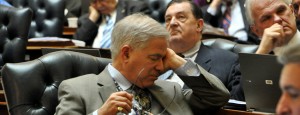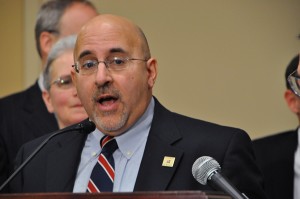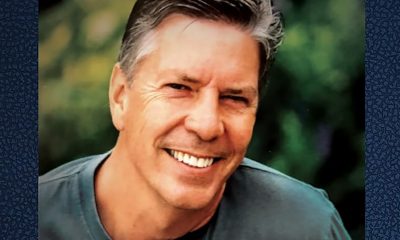Local
‘Strategic blunder of monstrous proportions’
Insiders rip HRC, Gill decision to cancel Maryland vote on marriage
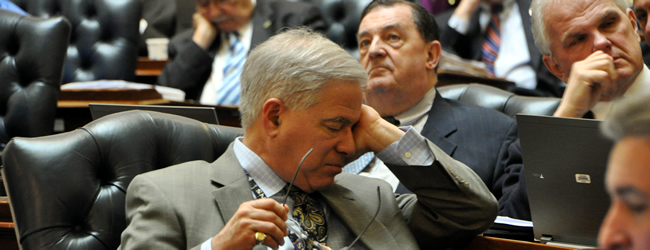
The decision to cancel a March 11 vote on a same-sex marriage bill in the Maryland House of Delegates was a mistake that could hurt rather than help the chances for passing the bill within the next several years, according to Maryland-based advocates who lobbied for the bill.
The advocates who expressed this view, some of whom spoke on condition that they not be identified, said at least four national LGBT groups put pressure on lawmakers through Equality Maryland, the statewide LGBT group, to withdraw the bill rather than risk a losing vote.
One of the advocates called the national groups and their political operatives who came to Maryland to lobby for the bill well intentioned but unfamiliar with the nuances and “rhythms” of the Maryland Legislature.
“I think this was a strategic blunder of monstrous proportions,” said Mark McLaurin, political director of Maryland’s Local 500 of the Service Employees International Union (SEIU), which lobbied for the bill.
McLaurin, a gay man who has lobbied the Maryland Legislature for progressive causes for more than 15 years, said many insiders familiar with the legislature don’t think a losing vote by a close margin would hurt the bill’s chances in the future.
On the other hand, McLaurin and others who favored taking a vote on the marriage bill said the legislature has a history of not taking up highly controversial bills two years in a row. McLaurin said he fears that the bill won’t come back for a vote until 2015, even though Speaker of the House Michael Busch (D-Anne Arundel County) said he would try to bring the measure back in 2012.
Busch said supporters appeared to fall just a few votes shy of the 71 votes needed to pass the bill in the 141-member House. However, he said wavering delegates might have chosen to vote “yes,” raising the possibility that the bill could have passed.
Several knowledgeable sources, who spoke on condition of anonymity, agreed with McLaurin’s assessment.
“Gill and HRC decided it was detrimental to the larger movement to have the vote go down,” one source said. “Gays and lesbians in Maryland deserved a debate and a vote on legislation that we waited years for.”
Another source criticized Busch’s handling of the bill.
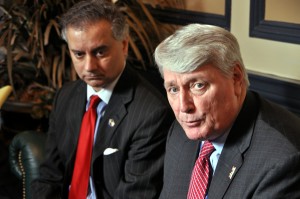
Maryland House of Delegates Majority Leader Kumar Barve and Maryland House Speaker Michael Busch (Washington Blade photo by Michael Key)
“[Speaker Michael] Busch could have squeezed harder but didn’t. This is a new House of Delegates and this man didn’t bother to take the temperature of the new House of Delegates. I was shocked. I thought House leadership was more strategic, intelligent and powerful than this and it all evaporated.
“God forbid we put our swing vote Democrats on the line to take a vote for our families. Or maybe the Speaker has lost control of his chamber.”
There was also criticism of Gov. Martin O’Malley, who the sources faulted for not taking a more public stand in support of the bill.
“O’Malley stopped by Friday for a photo op with marriage supporters,” one source said. “What a vacant gesture at the 11th hour. You couldn’t write an op-ed the week before?”
The Civil Marriage Protection Act won approval in the Maryland Senate earlier this month. It died last Friday for at least this year when the House of Delegates approved by voice vote a motion to send it back to committee.
All of the bill’s sponsors, including seven openly gay members of the House of Delegates, appeared to support the motion, a development that stunned LGBT activists watching the proceedings from the visitors’ gallery.
The motion to recommit the bill to committee came after supporters and opponents engaged in an emotional, two-and-a-half hour debate over the bill. Most of the activists for and against the bill watching from the galleries didn’t know that the bill’s sponsors had decided beforehand to cancel the vote.
McLaurin said he learned from those attending strategy meetings that the eight-member LGBT Caucus of the legislature was divided over whether to postpone the House vote.
The caucus includes Sen. Richard Madaleno (D-Montgomery County), and House of Delegates members Maggie McIntosh, Mary Washington, and Luke Clippinger, each Democrats from Baltimore; Heather Mizeur, Bonnie Cullison, and Anne Kaiser, each Democrats from Montgomery County; and Peter Murphy, a Democrat from Charles County.
Spokespersons for Equality Maryland, the statewide LGBT group that led the lobbying effort for the bill, and officials with the national groups Freedom to Marry and Human Rights Campaign defended the decision to withdraw the bill.
They said the decision was made jointly by the bill’s lead sponsors, including the one gay male and six lesbian delegates, who determined it was better to postpone the vote than to risk a losing vote, which they said would be perceived as a defeat.
“This is a strategic effort to give ourselves more time to make the case and win,” said Evan Wolfson, executive director of Freedom to Marry. “And all of us believe we can win. It’s just a matter of nailing down the votes and getting there.”
HRC spokesperson Fred Sainz said the decision to cancel the vote came after it became clear that supporters didn’t have the votes to pass it.
“This was a shared decision by all the stakeholders – Equality Maryland, the state’s LGBT Caucus, Gill Action, Freedom to Marry, and HRC,” he said. “It was the consensus belief that the best way to win marriage in Maryland was by a delay and not by losing a vote.”
Officials with Gill Action, a philanthropic group founded by gay businessman Tim Gill in Colorado that funds LGBT rights causes, did not return a call seeking comment.
An official with the Gay & Lesbian Victory Fund, Robin Brand, also pushed for postponing the vote, activists familiar with the legislature said. Brand told the Blade she discussed the issue with the gay delegates in the Victory Fund’s role of working with openly gay elected officials. She said she left it up to them to decide on whether or not a vote should be taken.
McLaurin, a former member of the Equality Maryland board, said the advocates who wanted the vote to go forward believe it would have been worth “a roll of the dice” to determine if supporters had the 71 votes needed to pass the bill.
“In the worst case scenario we would have come up two or three votes short,” he said. “And I think that a loss by two or three votes would be much more galvanizing to the community of supporters that we’re going to need to rally and accomplish this goal.”
McLaurin added, “Either way it was going to get billed as a failure. I’d rather have on record who’s with us and who’s against us.”
Another former Equality Maryland board member, David Toth, wrote in a Facebook posting that the group was deleting messages left on its own Facebook page that were posted by a large number of supporters who expressed outrage over the decision not to have a vote on the bill.
“Anyone who is asking questions of EqMD or its staff is having their posts deleted like crazy,” he wrote. “After donating thousands of dollars and working on the board for over six years I simply find this appalling.”
Wolfson of Freedom to Marry cautioned that a public fight over the decision not to have a vote could hurt efforts to bring the bill back next year.
“This is a temporary pause in the voting and it’s not a pause in the work,” he said. “So we don’t need finger pointing and recriminations, we need redoubling the effort to win.”
Although Equality Maryland, led by executive director, Morgan Meneses-Sheets, was billed as the lead organization calling the shots, insiders say field workers from the national groups like Freedom to Marry, HRC and Gill Action Fund far outnumbered Equality Maryland’s staffers working the halls of the legislature in Annapolis.
It was the national groups, rather than Equality Maryland, that had the ear of supportive lawmakers, including the LGBT Caucus members, during the days leading up to the scheduled vote on the bill in the House, McLaurin and other insiders said.
In a March 10 e-mail sent to LGBT Caucus members and other lawmakers supporting the bill, representatives of Freedom to Marry, Gill Action and HRC urged the lawmakers to postpone the vote.
“With the rights of so many Marylanders on the line, we wanted to flag our serious concern about going to a floor vote tomorrow when it’s not been confirmed we have 71 votes,” the e-mail says. “Various counts have us at 69 or 70 but not 71 or beyond.”
The e-mail adds, “The decision on whether to ask the leadership to move forward or postpone the vote rests with our openly LGBT legislators and other sponsors (in consultation with EQMD) who know their colleagues far better than we do, and who have so courageously led the way.”
The e-mail was signed by Bill Smith and Sarah Vaughn, national political director and deputy political director of Gill Action; Marty Rouse and Sultan Shakir, the lead officials at HRC’s field office; and Marc Solomon, national campaign director for Freedom to Marry.
In a separate e-mail sent the next day to most of the same people, HRC’s Rouse warned of serious political consequences if a vote on the marriage bill were to be taken.
“I plead with you to please delay this vote,” he said. “It would be devastating to suffer a huge loss. There will be vitriol and pain that may take years to soothe.”
Rouse said he also feared that a losing vote would damage relationships between the LGBT community and lawmakers who voted against the bill.
“I am sure that relationships are already frayed, but, if there are impassioned speeches on the floor, and tears shed, and we still lose, those relationships will be damaged even more. The air in the chamber will be toxic for months if not years,” he said.
McLaurin said at least some of the strained relations that Rouse mentioned have already come about, in part, because of the impassioned debate on the House floor that took place on March 11. He said he was puzzled over why those making the decision chose to have the debate and not go one step further to allow a vote to take place.
According to McLaurin, Speaker Busch left it up to the bill’s supporters and Equality Maryland to make the final call on whether to have a vote.
“From what I’ve been told by people in the know, he said, ‘What’s your pleasure? I’ll defer to you.’”
“And so from my understanding, there was a lot of pressure from the national organizations not to pull the trigger on a vote unless you are certain you had 71 votes because apparently it would demoralize our [same-sex marriage] efforts in Rhode Island and New York,” said McLaurin.
“I say poppycock. Pulling the bill from the floor is a defeat every bit as much as a losing vote is,” he said.
McLaurin said he thinks some of the national LGBT officials pushing for a delay in the Maryland vote had a fundamental misunderstanding that the Maryland House of Delegates would act like the New York State Senate acted in 2008, when it defeated a same-same marriage bill by a 38-24 vote.
Most supporters of the New York bill thought the vote would be much closer. Gay State Sen. Tom Duane (D-Manhattan) said he believed he had lined up enough votes to pass the measure. But when a roll-call vote started, a few wavering senators voted no, causing what observers called a cascading or “avalanche” effect, prompting others whose support was shaky to vote no.
McLaurin said such a development could not happen in the Maryland House of Delegates because all votes are cast electronically at the same time. No one knows who votes which way until the final tally is released seconds after the votes are cast. Pages on the floor then distribute a printout showing how the delegates voted.
“That’s why one of my underlying themes is you’ve got to know the Maryland Legislature,” he said. “We can’t have national groups fly in from L.A. and New York and train in from D.C. and conduct this campaign because we’re fundamentally different. We’re a different body.”
If some of the national group representatives had been in Annapolis at the time the legislature debated a highly contentious bill to repeal the state’s death penalty in 2007 or during several abortion related debates in the 1990s they would have seen a great reluctance to revisit these issues a second time, McLaurin said.
“What I fear is next year there’s just not going to be the stomach to do this again,” he said in discussing the marriage bill. “If you listened to the debate on the floor, everyone spoke of how deeply divided the House was, how deeply emotional this was, how it frayed relationships, how people weren’t speaking to each other.
“Do you think they will have the stomach to do that again next year without any reasonable expectation of a different outcome because they’re still pitching the same ideas to the same audience?”
“No one would be happier to be wrong about this than me,” he said. “But I just don’t think that I am. And I know I’m not alone. Some of the chief strategists behind this bill feel the same way I do.”
Wolfson of Freedom to Marry disputes that assessment.
“Anyone who is making comments to you or to anyone else suggesting that somehow this is over and it’s now a cause for finger pointing has failed to understand that it’s not over,” he said. “We’re in the midst of the work and we all should keep our eye on the prize of doing what we can to round up the last few votes and win.”
Virginia
Youngkin calls on gay Va. GOP LG candidate to exit race over alleged ‘porn’ scandal
John Reid denounces ‘fabricated internet lie’ as anti-gay smear campaign
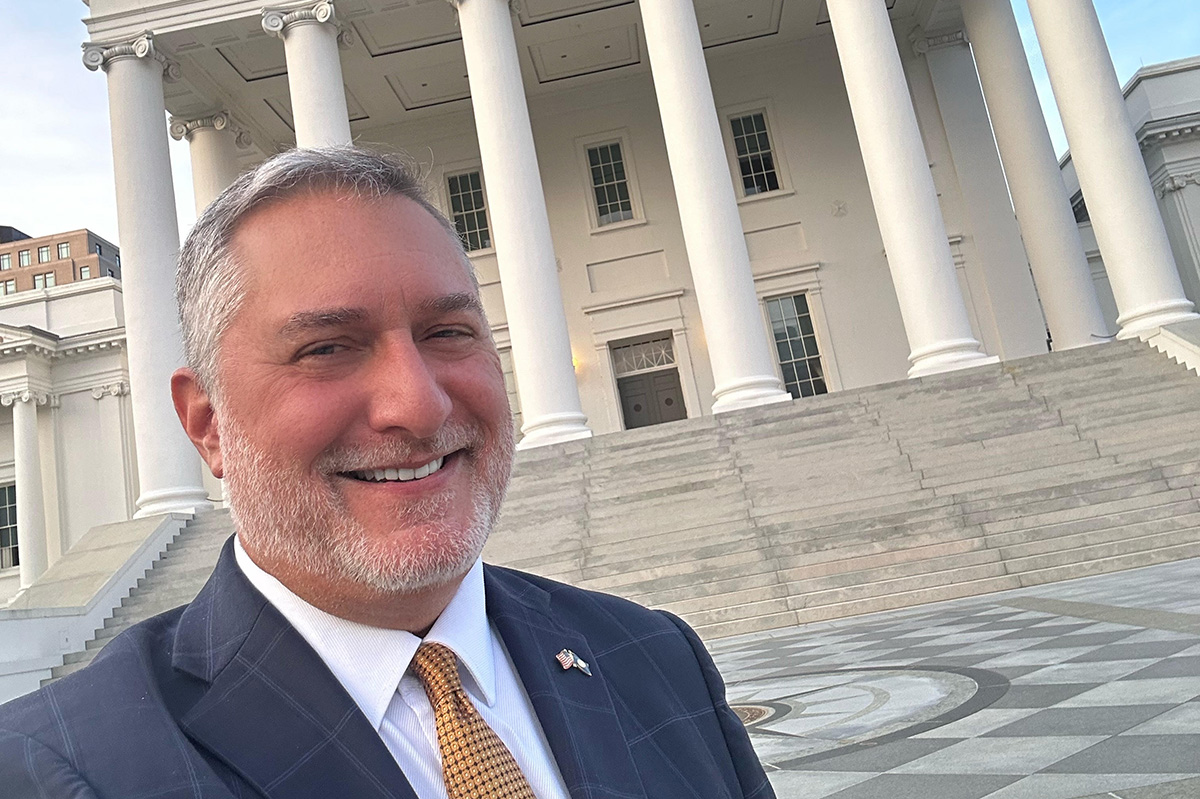
Less than a week after John Reid, the conservative gay radio talk show host from Richmond secured the Republican nomination for the office of lieutenant governor in Virginia, sensational allegations have surfaced, which he strongly denies, that he allegedly posted pornographic photos on social media.
According to the Virginia Mercury newspaper, the allegations surfaced when Virginia Gov. Glenn Youngkin’s office released a statement saying Youngkin contacted Reid on Friday, April 25, and asked him to withdraw his candidacy over reports that a social media account with Reid’s username included “pornographic content” that was “shared” with others.
“The governor was made aware late Thursday of the disturbing online content,” the Virginia Mercury quotes a Youngkin spokesperson as saying. “Friday morning, in a call with Mr. Reid, the governor asked him to step down as the lt. governor nominee,” the spokesperson is quoted as saying.
Reid responded to the allegations in an early Friday evening video he posted on his campaign’s Facebook page, calling the allegations “a totally fabricated internet lie” motivated by anti-gay bias.
“I can tell you that’s not my account and anyone on the internet can open accounts with the same or similar names as other people,” he stated in his video. “It’s predictable,” he added.
“But what I didn’t expect was the governor I have always supported to call and demand my resignation without even showing me the supposed evidence or offering me a chance to respond,” Reid states in his video.
He said he will not drop out of the lieutenant governor’s race and called the allegations against him just the latest in what he said was an ongoing effort by some in the Republican Party, especially conservative Christians, to force him out of politics.
“Let’s be honest,” he said. “it’s because I’m openly gay. And I have never backed down to the establishment, and will not,” he continued in his video message. “What happened today is another coordinated assassination attempt against me to force the first openly gay candidate off of a Virginia statewide ticket.”
Reid added, “It’s shameful, and I won’t back down, even though I know the plan is for the attacks to continue in this overt effort to make me toxic.”
Reid secured the GOP nomination for lieutenant governor last week after his only rival in the Republican primary, Fairfax County Supervisor Pat Herrity, dropped out of the race for health reasons.
By securing the nomination Reid became the first known openly gay candidate, Republican or Democrat, to be nominated for a statewide office in Virginia.
In an interview with the Washington Blade earlier this week Reid pointed out that he came out as gay in 1996 or 1997 on National Coming Out Day in his role as TV news anchor in Richmond, where he worked for 10 years.
Following that, Reid worked as a radio talk show host for the next eight years, promoting his ideas as a gay conservative Republican, up until shortly before he announced his candidacy for lieutenant governor, he told the Blade.
Reid’s video responding to the accusations against him can be accessed here.
Reid’s campaign website and statements he has released to the media acknowledge his status as a gay candidate but point out he has a long record of support for conservative Republican positions on a wide range of issues that are against the positions of most mainline LGBTQ rights organizations.
“I’m not a diversity hire,” he stated in a press release issued at the time he announced his candidacy in January. “I’m the most conservative and proven candidate running, and I’ve boldly stood up for our beliefs in a way that should make my personal life a total nonissue,” he stated.
A statement on his campaign website states “John is uniquely positioned to take the fight to the radical progressives head on as he continues his fight against boys in girls’ sports and the extreme trans agenda being forced upon our children.”
His campaign website statement on transgender issues concludes by saying, “And we must be blatant in saying that it is factually impossible for biological men or women to personally decide to change their gender. John believes in the right for grown adults to live their lives as they see fit, but not if they impose restrictions and obligations on others and not if any of their behavior sexualizes or grooms children.
Maryland
A Baltimore theater educator lost jobs at Johns Hopkins and the Kennedy Center
Tavish Forsyth concluded they could not work for Trump

BY WESLEY CASE | Tavish Forsyth had come to a conclusion: They could not work for President Donald Trump.
So the 32-year-old Baltimore resident stripped down, turned on their camera, and lit their career on fire.
“F—— Donald Trump and f—— the Kennedy Center,” a naked Forsyth, an associate artistic lead at the Washington National Opera’s Opera Institute, which is run by the Kennedy Center, said in a video that went viral. The board of the nation’s leading cultural institution had elected Trump just weeks prior as its chairman after he gutted the board of members appointed by his predecessor, President Joe Biden.
The rest of this article can be read on the Baltimore Banner’s website.
District of Columbia
Little Gay Pub to host April 25 celebration of life for Patrick Shaw
School teacher, D.C. resident praised for ‘warmth, humor, kindness’
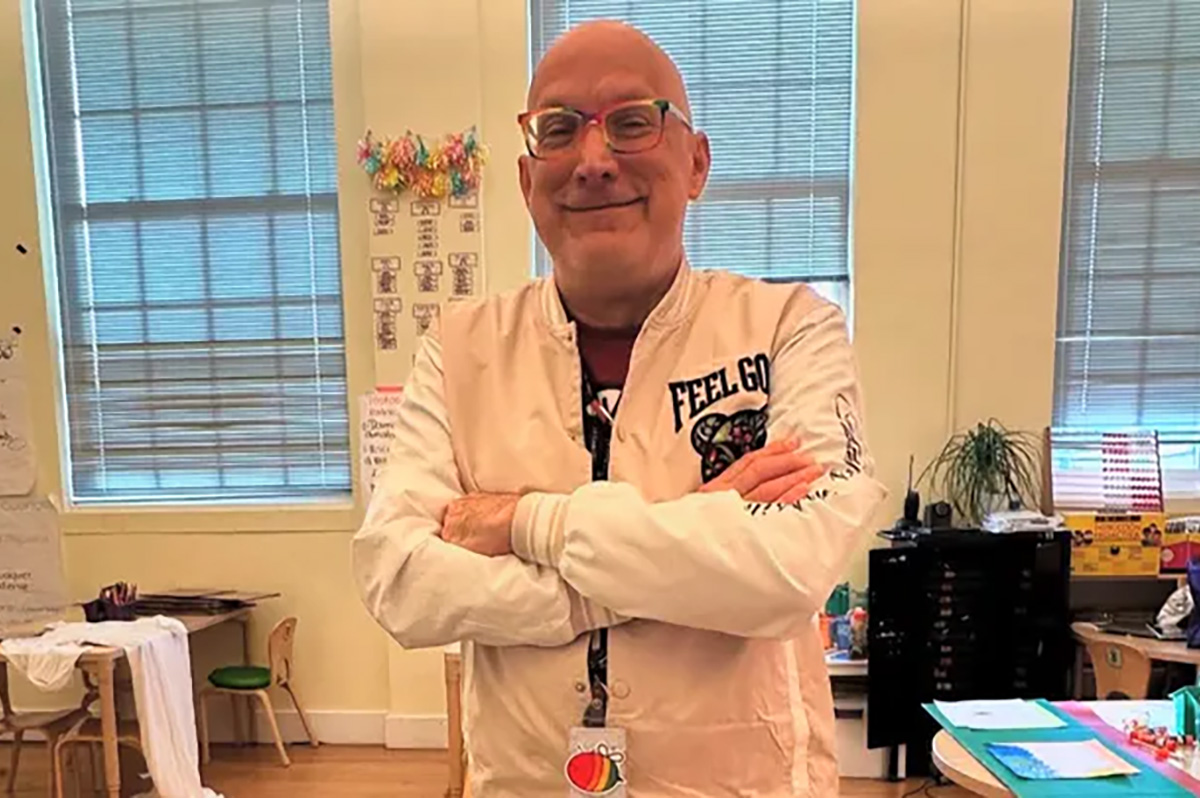
Co-workers and friends will hold a celebration of life for highly acclaimed schoolteacher and D.C. resident Patrick Shaw beginning at 5:30 p.m. Friday, April 25 at The Little Gay Pub 1100 P St., N.W.
Little Gay Pub co-owner and Shaw’s friend, Dusty Martinez, said Shaw passed away unexpectedly on April 19 from a heart related ailment at the age of 60.
“Patrick touched so many lives with his warmth, humor, kindness, and unmistakable spark,” Martinez said. “He was a truly special soul – funny, vibrant, sassy, and full of life and we are heartbroken by his loss.”
In an Instagram posting, Shaw’s colleagues said Shaw was a second-grade special education teacher at the J.F. Cook campus of D.C.’s Mundo Verde Bilingual Public Charter School.
“Patrick brought warmth, joy, and deep commitment to Mundo Verde,” his colleagues said in their posting. “His daily Broadway sing-alongs, vibrant outfits, and genuine love for his students filled our community with energy and laughter.”
The posted message adds, “Patrick was more than a teacher; he was a light in our school, inspiring us all to show up with heart, humor, and kindness every day. His spirit will be deeply missed.”
The Washington Blade is preparing a full obituary on Patrick Shaw to be published soon.
-

 Federal Government5 days ago
Federal Government5 days agoHHS to retire 988 crisis lifeline for LGBTQ youth
-

 Opinions5 days ago
Opinions5 days agoDavid Hogg’s arrogant, self-indulgent stunt
-

 District of Columbia5 days ago
District of Columbia5 days agoD.C. police seek help in identifying suspect in anti-gay threats case
-

 Opinions4 days ago
Opinions4 days agoOn Pope Francis, Opus Dei and ongoing religious intolerance

